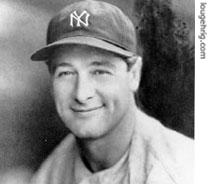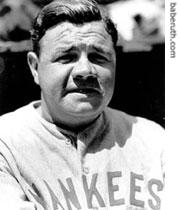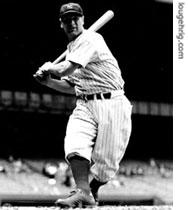VOA慢速英语 2008 0330
时间:2018-12-07 作者:英语课 分类:VOA慢速英语2008年(三)月
PEOPLE IN AMERICA - Lou Gehrig, 1903-1941: The Great Baseball Player Considered Himself 'The Luckiest Man on the Face of the Earth'
He played in 2,130 games without missing 1 one. Transcript 2 of radio broadcast:
29 March 2008
ANNOUNCER:
Now, the VOA Special English program, PEOPLE IN AMERICA.
A North American Major League baseball record was established in nineteen thirty-nine. The man who set it played in two thousand one hundred thirty games without missing one. In nineteen ninety-five, the record was broken by Cal Ripken of the Baltimore Orioles. But there is not much chance that the man who set the first record will be forgotten.
Today Shirley Griffith and Steve Ember tell about Lou Gehrig whose record lasted for fifty-six years.
(MUSIC)
VOICE ONE:

Lou Gehrig
Lou Gehrig was born on June nineteenth, nineteen-oh-three. He was a huge baby. He weighed six-and-one-third kilograms. His parents, Heinrich and Christina Gehrig, had come to America from Germany. They worked hard. But they always had trouble earning enough money.
Lou loved to play baseball games on the streets of New York City, where he grew up. Yet he did not try to play on any sports teams when he entered high school. He thought of himself as a ball player only for informal games with friends.
Then one of Lou's high school teachers heard that he could hit the ball very hard. The teacher ordered Lou to come to one of the school games.
VOICE TWO:
Years later, Lou said: "When I saw so many people and heard all the noise at the game, I was so scared I went home." The teacher threatened to fail Lou in school if he did not attend the next game.
So Lou Gehrig went to that game. He became a valued member of the high school team. He also played other sports. The boy who feared noise and people was on his way to becoming a star baseball player.
VOICE ONE:
A representative of a major league team, the New York Giants, came to watch him. He got Lou a chance to play for the manager of the Giants' team, John McGraw. McGraw thought Gehrig needed more experience before becoming a major league player. It was suggested that Lou get that experience on a minor 3 league team in the city of Hartford, Connecticut.
Lou played in Hartford that summer after completing high school. He earned money to help his parents. His father was often sick and without a job.
VOICE TWO:
The money Lou earned also helped him attend Columbia University in New York City. The university had offered him financial help if he would play baseball on the Columbia team.
But, the fact that Gehrig had accepted money for playing professional baseball got him into trouble. Officials of teams in Columbia's baseball league learned 4 that Lou had played for the professional team in Hartford. The other teams got him banned from playing for Columbia during his first year at the college.
Gehrig was permitted to play during his second year, though. He often hit the ball so far that people walking in the streets near the baseball field were in danger of being hit.
VOICE ONE:
Lou's mother earned money as a cook and house cleaner. But she became very sick. The family could not make their monthly 5 payments 6 for their home.
The New York Yankees major league baseball organization came to the rescue. The Yankees offered Lou three thousand five hundred dollars to finish the nineteen twenty-three baseball season.
That was a great deal of money in those days. Gehrig happily accepted the offer. His parents were sad that he was leaving Columbia. Yet his decision ended their financial problems.
VOICE TWO:
The Yankees recognized that Gehrig was a good hitter. They wanted him to add to the team's hitting power provided 7 by its star player, Babe Ruth. But Gehrig had trouble throwing and catching 8 the ball. So they sent him back to the minor league team in Hartford. While playing there he improved his fielding. He also had sixty-nine hits in fifty-nine games.
VOICE ONE:
The next spring Gehrig went to spring training camp with the Yankees. Again he was sent to Hartford to get more experience. And again, the Yankees called him back in September. He hit six hits in twelve times at the bat before that baseball season ended.
Lou Gehrig began to play first base for the Yankees regularly in early June of nineteen twenty-five. He played well that day and for the two weeks that followed.
Then Gehrig was hit in the head by a throw to second base. He should have left the game. But he refused to. He thought that if he left, he never again would have a chance to play regularly.
VOICE TWO:

Babe Ruth
Gehrig continued to improve as a player. By Nineteen twenty-seven, pitchers 9 for opposing teams were having bad dreams about Lou Gehrig and Babe Ruth. Ruth hit sixty home runs that year. Gehrig hit forty-seven and won the American League's Most Valuable Player Award. Nobody was surprised when the Yankees won the World Series.
Gehrig, however, almost did not play. His mother had to have an operation. He felt he should be with her. Missus Gehrig and the Yankees' manager urged him to play in the World Series. His mother recovered.
More major threats to Gehrig's record of continuous 10 games played took place in nineteen twenty-nine. His back, legs and hands were injured. He was hit on the head by a throw one day as he tried to reach home plate. Another Yankee player said: "Every time he played, it hurt him."
VOICE ONE:
Gehrig felt good in nineteen thirty. He said his secret was getting ten hours of sleep each night and drinking a large amount of water.
Lou Gehrig now was becoming one of the greatest players in baseball history. He hit three home runs in the World Series of nineteen thirty-two. His batting average was five-twenty-nine. The manager of an opposing team, the Chicago Cubs 11, said of Gehrig: "I did not think a player could be that good."
VOICE TWO:
In nineteen thirty-three, Gehrig married Eleanor Twitchell. Eleanor helped him take his place as one of baseball's most famous players. The younger Lou Gehrig had stayed away from strangers when he could. The married Lou Gehrig was much more friendly.
As time went on, Gehrig played in game after game. He appeared not to have thought about his record number of continuous games played until a newspaper reporter talked to him about it.
An accident during a special game played in Virginia almost broke the record. Gehrig was taken to a hospital after being hit in the head with a pitch. He played the next day, though. He just wore a bigger hat so people could not see his injury.
VOICE ONE:

Lou Gehrig batting
Gehrig completed his two-thousandth game on May thirty-first, Nineteen thirty-eight. That was almost two times as many continuous games as anyone ever had played before.
Gehrig finished that season with a batting average of almost three hundred. He scored one hundred fifteen runs. He batted in almost as many runs.
But the Lou Gehrig of that year was not the Lou Gehrig of earlier years. He walked and ran like an old man. He had trouble with easy catches and throws. Yet his manager commented: "Everybody is asking what is wrong with Gehrig. I wish I had more players on this club doing as poorly as he is doing."
VOICE TWO:
Gehrig thought his problems were temporary. Then he fell several times the next winter while ice skating with Eleanor. He had trouble holding onto things. And he failed to hit in three games as the next season opened. In May, nineteen thirty-nine, he finally told his manager he could not play.
Lou Gehrig had played in two thousand one hundred thirty games without missing any that his team played.
Gehrig observed his thirty-sixth birthday on June nineteenth. That same day, doctors told him he had a deadly disease 12 that attacks the muscles in the body. The disease is called amyotrophic lateral 13 sclerosis. Today, it is known as Lou Gehrig's Disease.
VOICE ONE:
Gehrig did not act like a dying 14 man, though. He refused to act frightened or sad.
On July fourth, nineteen thirty-nine, more than sixty thousand people went to Yankee Stadium to honor 15 one of America's greatest baseball players. Gehrig told the crowd he still felt he was lucky. His words echoed 16 throughout the stadium.
LOU GEHRIG:
"I consider myself the luckiest man on the face of the Earth. I might have been given a bad break, but I've got an awful lot to live for. Thank you."
VOICE TWO:
Gehrig fought his sickness. But he became weaker and weaker. He died on June second, nineteen forty-one. He was thirty-seven years old.
America mourned the loss of a great baseball hero. Those who knew him best - family, friends, baseball players -- mourned the loss of a gentle man.
(MUSIC)
ANNOUNCER:
This Special English program was written by Jeri Watson and produced by Lawan Davis. Your narrators were Shirley Griffith and Steve Ember. I'm Rich Kleinfeldt. Join us again next week for another PEOPLE IN AMERICA program on the Voice of America.
- Check the tools and see if anything is missing.检点一下工具,看有无丢失。
- All the others are here;he's the only one missing.别人都来了,就短他一个。
- A transcript of the tapes was presented as evidence in court.一份录音带的文字本作为证据被呈交法庭。
- They wouldn't let me have a transcript of the interview.他们拒绝给我一份采访的文字整理稿。
- The young actor was given a minor part in the new play.年轻的男演员在这出新戏里被分派担任一个小角色。
- I gave him a minor share of my wealth.我把小部分财产给了他。
- He went into a rage when he learned about it.他听到这事后勃然大怒。
- In this little village,he passed for a learned man.在这个小村子里,他被视为有学问的人。
- The rent on his apartment was his biggest monthly expense.他的房租是每个月最大的开支。
- The monthly rent is $15,inclusive of light and water.每月租金15美元,包括水电费在内。
- Welfare payments cease as soon as an individual starts a job. 一旦就业,即停发福利救济。
- The law can compel fathers to make regular payments for their children. 这项法律可强制父亲定期支付子女的费用。
- Provided it's fine we will have a pleasant holiday.如果天气良好,我们的假日将过得非常愉快。
- I will come provided that it's not raining tomorrow.如果明天不下雨,我就来。
- There are those who think eczema is catching.有人就是认为湿疹会传染。
- Enthusiasm is very catching.热情非常富有感染力。
- Over the next five years, he became one of the greatest pitchers in baseball. 在接下来的5年时间里,他成为了最了不起的棒球投手之一。
- Why he probably won't: Pitchers on also-rans can win the award. 为什麽不是他得奖:投手在失败的球队可以赢得赛扬奖。
- She finally got in after 10 years'continuous effort.坚持不懈地努力了十年后,她终于当选了。
- We must be continuous to study.我们必须不断学习。
- a lioness guarding her cubs 守护幼崽的母狮
- Lion cubs depend on their mother to feed them. 狮子的幼仔依靠母狮喂养。 来自《简明英汉词典》
- The doctors are trying to stamp out the disease.医生正在尽力消灭这种疾病。
- He fought against the disease for a long time.他同疾病做了长时间的斗争。
- An airfoil that controls lateral motion.能够控制横向飞行的机翼。
- Mr.Dawson walked into the court from a lateral door.道森先生从一个侧面的门走进法庭。
- He was put in charge of the group by the dying leader.他被临终的领导人任命为集团负责人。
- She was shown into a small room,where there was a dying man.她被领进了一间小屋子,那里有一个垂死的人。